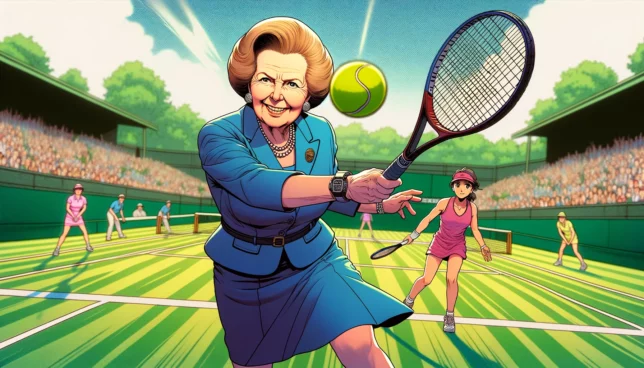
> Former British Prime Minister Margaret Thatcher playing tennis on a tennis court in a Japanese anime style, showcasing the “Wimbledon Effect”. Thatcher is dressed in a tennis outfit, holding a racket, and focused on a powerful serve. The setting is colorful and vibrant, reflecting the spirit of anime. The scene captures her determination and energy, with dynamic action lines emphasizing her movement. The background features a classic Wimbledon-like tennis court, with a subtle nod to the “Wimbledon Effect”. Aspect ratio 16:9.
今日は週末金曜日なのでアサカイは新聞記事ピックの振り返りでしたが、ゴールデンウィークがあったこともあり2週間分でした。
とても1時間では終わらないなぁと思ってましたが案の定終わりませんでした。
そして時間ギリギリ最後の記事はこれでした。
AIのウィンブルドン現象/The Wimbledon Effect of AI
ピックする前から、ほとんどのメンバーがこの言葉、「ウィンブルドン現象」は知らないだろうなぁと思ってはいました。でも知っておいた方が色々と使える用語だし、この言葉を知ることで経済の歴史、金融の歴史みたいなことにも触れることになるのでやはり知っておきたいと思いピックすることにしました。
ちょうど一ヶ月前に取り上げたこの記事とも深く関係していますからね。
Dくん、ウィンブルドン現象って知ってますか?
それである新人の子にこの「ウィンブルドン現象」って知ってますかって当てたら。仮に名前をDくん(まだ入社間もないのでニックネームが決まってません)としておきます。
彼は調べました、はい調べましたと言いました。
ん?調べた。
知ってるか知らないかを聞きたかったのに、他のメンバーと会話している間に調べてくれたようですね。
そこで僕は思わず、D君調べたんやーと言ってしまったんです。
言ってしまった後に、話の前後も説明せずににこれだけ言ってしまうととても乱暴なことに気づきました。彼の表情も少し困惑していたようですが、なにせアサカイは時間がありません。その時既に1時間が経っていたので満足な説明はできないままに終わってしまったので今こうして真意を述べさせていただいてます。
彼としては親切で調べてくれたんだと思うんです。なのにALの僕からは調べんなよーと言われてしまった。
調べてくれてありがとう、だけど。
ここでも書いてることですけども物事は調べて良い時とそうでないときってあると思うんです。
もう今の時代は調べたら即座に答えは出てくる時代ですよね、検索はますます便利で強力になってますからね。そのうちAIも普通にアシスタントとして出てくるでしょうから調べるという行為自体がなくなるかもしれません。
そうなった時大切なのは目の前の人と対話することだと思うんです。
私たちは会社組織ですから仲間がいます、自分が知らないことも周りが助けてくれるそういった環境の中にいます。知らないときには彼らの話に耳を傾ける、あるいは彼らに聞くことがとても大切だと思うんです。
知らなければ知らないで全然構わないと思うんです。
それが何か自分の落ち度であるわけもないしウィークポイントにもならない、ただたまたま知らなかったと言うだけ。
そしてそれを人に聞いてみることで、聞かれた人は知っている知らないに関わらず伝える力がつよくなります。人に教えるとはそういうことでしょう。
そしてどうでしょうか、ネットで調べるのと人から聞くのとどちらが面白いでしょうか。
自分で調べる努力ももちろん大切。
知らないことを自分で調べて知る楽しみもももちろんありますし、これが業務となった場合にはそういった自分一人で調べる力や努力はとても大切です。
人に聞いてばかりでは成長しませんね。
アサカイは業務ではなく仕事
だけど、アサカイは業務ではありません。今会社で起きている問題を話し合ったり、予定を確認し合ったり、新聞記事を読むことで社会で起きていることやその背景についてみんなで学ぶ場です。
そんな場では知らないことを聞く、知っているかもしれないことは答える。そんな関係をを大切にしていきたいんです。
私たちはテレワークで毎日やってますから。もしもみんなが相談もなくそれぞれに調べだしたら極端に言うと会話の必要はなくなり、会社そのものも必要でなくなっていくように思います。
そんな危惧からつい彼に”調べたんやー”とだけ言ってしまいました。
済まないね、Dくん。
彼は日本語ネイティブではないので彼にちゃんと伝わるようにこの投稿は英訳しておきます。
The True Meaning Behind “Don’t Look It Up!”
Today was the weekly Friday Asakai where we reviewed newspaper article picks, but since there was a Golden Week holiday, it covered two weeks’ worth of articles.
I thought it would definitely not end in just one hour, and as expected, it did not.
And the last article we covered, right at the end, was this one.
The Wimbledon Effect of AI
Before picking this article, I thought that most members probably wouldn’t know the term “Wimbledon Effect”. But I felt it’s a useful term to know, and learning about it would also expose us to topics like economic history and financial history, so I decided to pick it.
It’s also deeply related to this article we covered about a month ago.
D-kun, do you know about the Wimbledon Effect?
So when I asked this new employee if he knew about the “Wimbledon Effect” – let’s call him D-kun for now since he just joined and doesn’t have a nickname yet.
He said “I looked it up, yes I looked it up.”
Hm? He looked it up.
I wanted to know if he knew it or not, but it seems he looked it up while I was talking with the other members.
So I blurted out without thinking, “D-kun, don’t look it up!”
After saying it, I realized it was very rude of me to say just that without explaining the context. He looked a bit puzzled, but we didn’t have much time left in the Asakai. An hour had already passed by then, so I couldn’t give a proper explanation and had to end it there. That’s why I’m explaining my true intentions here now.
I think he kindly looked it up for us. But then I, the AL, told him not to look it up.
Thanks for looking it up, but…
As I’ve written here before, I believe there are times when it’s good to look things up and times when it’s not.
In this day and age, you can find answers by looking things up, and search is becoming more and more convenient and powerful. Eventually AI assistants may become commonplace, and the act of looking things up itself might disappear.
When that happens, I think what’s important is having dialogue with the person in front of you.
We’re part of a company organization, so we have colleagues. We’re in an environment where others can help us with things we don’t know. When you don’t know something, I think it’s very important to listen to what they have to say, or to ask them about it.
I don’t think it matters at all if you don’t know something.
It’s not some fault of yours or a weak point, it just happens to be something you didn’t know.
And by asking others about it, the person being asked will get better at communicating regardless of whether they knew the answer or not. That’s what teaching others is about.
And what do you think, which is more interesting – looking it up online or asking a person?
Of course, the effort to look things up yourself is important too.
There’s certainly joy in looking up things you don’t know and learning about them, and if it’s part of your work duties, the ability and effort to look things up on your own is very important.
You won’t grow if you only rely on asking others.
The Asakai is not just a task, but meaningful work.
However, Asakai is not just a routine task. It’s a place for us to discuss issues happening in the company, align our schedules, and learn together about what’s happening in society and the background behind it by reading newspaper articles.
In a setting like that, you ask about things you don’t know, and answer about things you might know. I want us to value that kind of relationship.
We do telework every day. If everyone started looking things up on their own without consulting each other, taken to the extreme it would eliminate the need for conversation, and I think it would make the company itself unnecessary.
It was out of that concern that I ended up just telling him “don’t look it up”.
I’m sorry, D-kun.
Since he’s not a native Japanese speaker, I’ll translate this post into English so he can understand it properly.
Translated by Claude3 opus.
